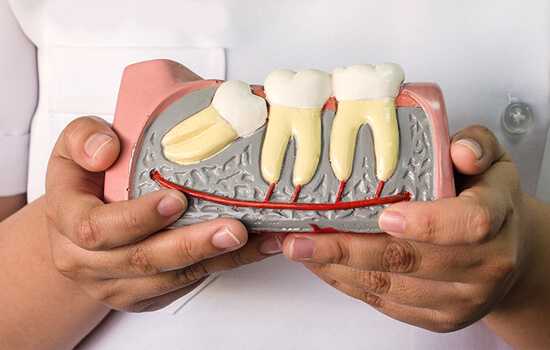
The Ultimate Guide To Wisdom Tooth Extraction

Introduction
Wisdom teeth, or third molars, typically emerge in late adolescence or early adulthood. While some individuals have no issues with these teeth, others may experience pain, infection, or misalignment due to the limited space in their mouths. Wisdom tooth extraction becomes necessary in such cases to maintain oral health and prevent further complications.
About Wisdom Tooth Extraction
What Are Wisdom Teeth?
Wisdom teeth are the third set of molars that usually emerge between the ages of 17 and 25. These teeth were once vital for our ancestors, who had a diet that required additional grinding power. However, with modern diets and improved dental hygiene, wisdom teeth have become largely unnecessary and often problematic due to their tendency to cause dental issues.
Why Do Wisdom Teeth Need Extraction?
The main reason wisdom teeth often require extraction is their potential to cause dental problems. Due to limited space in the jaw, these late-emerging molars can become impacted, meaning they don't fully emerge from the gum line. This can lead to pain, infection, swelling, and damage to nearby teeth.
When Should You Consider Wisdom Tooth Extraction?
The decision to undergo wisdom tooth extraction is typically made based on a dentist's recommendation. Common reasons for extraction include pain, infection, gum disease, and the risk of cysts or tumors developing around impacted wisdom teeth. Dentists may also recommend extraction as a preventive measure for individuals with no current issues to avoid potential future complications.
Who Performs Wisdom Tooth Extraction?
Wisdom tooth extraction is typically performed by oral surgeons or general dentists with surgical experience. These professionals have the expertise to safely and efficiently remove wisdom teeth while ensuring patient comfort.
The Wisdom Tooth Extraction Procedure
Preparing for the Procedure
Before the extraction, your dentist or oral surgeon will conduct a thorough examination, including X-rays, to assess the position of your wisdom teeth and plan the procedure. They will also discuss anesthesia options with you to ensure a painless experience.
Anesthesia
Wisdom tooth extraction can be performed under local anesthesia, conscious sedation, or general anesthesia, depending on the complexity of the case and your comfort level. Your dental professional will determine the most appropriate option for your specific situation.
Extraction Process
During the procedure, the dentist or oral surgeon will make an incision in the gum tissue to access the tooth. If the tooth is impacted, they may need to remove a small portion of bone to reach it. Once the tooth is extracted, any incisions are closed with stitches.
Post-Extraction Care
After the extraction, you will receive detailed instructions for post-operative care. This typically includes guidelines on pain management, oral hygiene, and dietary restrictions. It's crucial to follow these instructions diligently to ensure a smooth recovery.
Recovery and Aftercare
Immediate Aftermath
In the hours following the procedure, you may experience some bleeding and swelling. Applying an ice pack and taking prescribed pain medications as directed can help alleviate discomfort. Resting and avoiding strenuous activities are also advisable.
Diet
For the first few days, it's best to stick to soft foods that don't require much chewing. Avoid hot, spicy, or hard foods that could irritate the surgical site.
Oral Hygiene
Maintaining good oral hygiene is essential during the recovery period. You'll need to be gentle when brushing your teeth and avoid the extraction site. Rinsing your mouth with warm saltwater can aid in keeping the area clean and free from infection.
Follow-Up Appointments
Your dentist or oral surgeon will schedule follow-up appointments to monitor your progress and remove any remaining stitches. Be sure to attend these appointments as recommended to ensure proper healing.
To book an appointment with Dr. Roshan's Advanced Dental Care And Implant Center or more please, call us at +91-8104026179 or visit our website HERE; https://drroshandental.com/wisdom-tooth-extraction.php
Conclusion
Wisdom tooth extraction is a common dental procedure that can improve your oral health and prevent future complications. It is essential to consult with your dentist if you are experiencing pain or discomfort due to your wisdom teeth. By following the guidance provided in this comprehensive guide, you can be well-prepared for the procedure and a smooth recovery.
FAQs
Are Wisdom Teeth Always Removed?
No, not everyone needs to have their wisdom teeth removed. The decision depends on individual factors, including the size of the jaw and the angle at which the teeth are growing. Your dentist will assess your specific situation and recommend extraction if necessary.
Is Wisdom Tooth Extraction Painful?
The procedure itself should be painless due to anesthesia. However, some discomfort and swelling are normal in the days following the extraction. Your dentist will prescribe pain medication to manage any pain effectively.
How Long Does the Recovery Take?
Recovery times can vary, but most people can resume normal activities within a few days to a week. Complete healing of the extraction site may take several weeks.
Can I Eat Normally After Wisdom Tooth Extraction?
Initially, you should stick to soft foods and gradually reintroduce harder foods as your mouth heals. Follow your dentist's dietary recommendations for a smoother recovery.
What Are the Risks of Wisdom Tooth Extraction?
While complications are rare, potential risks include infection, dry socket (a painful condition where the blood clot at the extraction site dislodges), nerve damage, and prolonged swelling or pain. These risks can be minimized by following post-operative care instructions and attending follow-up appointments.
Can I Drive Home After the Procedure?
If you receive general anesthesia, you should arrange for someone to drive you home after the procedure, as you may be groggy or disoriented.
Author Bio
This user has not submitted a user bio yet
Article Comments
No Comments!
At present there are zero comments on this article.
Why not be the first to make a comment?
Similar Articles
Search Pages
User Upgrade
account to full use of editor,
Including hyperlinks
Article Categories
There are zero sub-categories in this parent category.
There are zero sub-categories in this parent category.

















